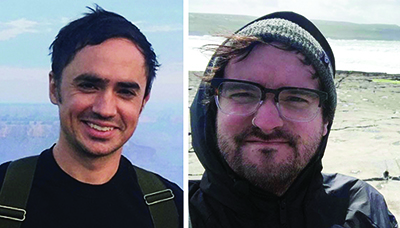 Many of the options are interdisciplinary in nature and expand the Brown culture of the Open Curriculum for doctoral students as another opportunity to distinguish themselves on the job market.
Many of the options are interdisciplinary in nature and expand the Brown culture of the Open Curriculum for doctoral students as another opportunity to distinguish themselves on the job market.
“The graduate certificate in Science and Technology Studies (STS) provides an invaluable opportunity for students from a wide range of academic departments and programs across the university to immerse themselves in this interdisciplinary field and form connections with one another,” says Lukas Rieppel, the David and Michelle Ebersman Assistant Professor of History.
Matthew Ellis, a PhD student in Modern Culture and Media is completing a certificate in STS. “As a cinema studies scholar, I never thought that I’d have a chance to work alongside scholars who study biology or the history of alchemy, and I certainly never thought that the research they share might help me work through questions about film art in the twenty-first century, but it has,” says Ellis.
He first learned about the certificate program during one of his final semesters of coursework while taking The Politics of Knowledge, a history course outside of his home department where the instructor mentioned the option. A fellow student had recommended the course and Ellis found that the content corresponded well with his comprehensive exam work.
As with many types of interdisciplinary research, the certificate programs give students an opportunity to study a second area, which can often help expand a dissertation topic or perspective.
Thomas Pringle, also a doctoral student in Modern Culture and Media, originally learned about the STS Certificate through a reading group. He was eager for more robust training in core area of his dissertation topic.
“This Certificate has given me the opportunity to read and engage with the scholarship of researchers that is not available in the coursework of my own or other departments on campus. This greatly assisted me in framing my legibility as a scholar, particularly when applying for jobs,” says Pringle.
Ellis has also appreciated the community of doctoral students completing the STS certificate. “The chance to bounce ideas off peer scholars from disciplines and approaches I wouldn't otherwise have access to--who yet end up giving some of the best feedback possible--is too good an opportunity to pass up.”
Ellis is currently completing his dissertation, The Return of History: Twenty-First Century Cinema at the 'End' of Neoliberalism. In the course of his research, Ellis found it very helpful to employ the tenants of the STS Certificate instruction along with existing literature in cinema studies and political theory.
“Having this certificate certainly allows me to position myself as a more nuanced scholar with at least a foot in an exciting field that I think has a lot to say to the traditional film and media studies traditions I inhabit.” says Ellis.
Pringle’s dissertation is about how cultures express vernacular knowledge of climate change through digital media representations. He notes that the STS Certificate was influential for his work because it gave him the opportunity to workshop his research with peers interested in similar questions.
As Pringle enters the job market, he’s looking for tenure track appointments in a media studies department, but also positions in science and technology studies. “The certificate has helped me gain the confidence to do that,” he says.
Ellis shares the following advice with other students, “While I came to the STS certificate late in my coursework to help me work through a problem I knew I was going to face in my dissertation, I know my friends and peers who entered the program early in coursework are finding it helpful for squaring up exactly what they even want to do for their dissertation research. Plus, you get a free lunch, sometimes.”
To pursue a certificate program, students need the support of the department in which they are pursuing the doctoral degree and the program offering the certificate. Certificates typically require three to five courses and sometimes require a substantial piece of written work, internship, practicum or another project. The programs are offered at no charge to eligible doctoral students. Learn more about Doctoral Certificates.